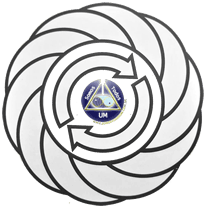The Dance of Life PART 5: The holistic conception
 Publicado por Sônia Imenes
em STUM WORLD
Publicado por Sônia Imenes
em STUM WORLDCompartilhe
Translated by Nancy Juozapavicius - [email protected]
The fragmented vision of the human body - as it was a machine - gave place to a holistic vision; it is understood that there is a relation and essential interdependence of all the phenomena: physical, biological, psychological, social and cultural. So the question of health and the therapeutic methods goes to an integration of all the areas of knowledge (Physics, Biology, Psychology, Medicine, Sociology, Arts, etc) in a complete, systemic approach of the individual upon its relationship with the environment where he lives.
This “new” approach is not new. It is in harmony with many traditional conceptions not only belonging to other cultures, such as the eastern, but also finds it roots in an old system of the western tradition: the Hippocratic medicine. Health, according to the writings of Hippocrates (Greece, 400 BC) requires a state of balance concerning environmental influences, way of life and several other “mechanisms” of human nature. Among those, some were described as “humors” and “passions”. The “humors” would be related to the chemical-hormonal balance, and the “passions” to the interdependence of mind and body.
Hippocrates also recognized there were healing forces inherent to the living organisms, called the “healing power of nature”. The role of the doctor consisted in serving those forces, creating more favorable conditions for the healing process. The original meaning of the word “therapy” comes form the Greek “therapeuin” and means “give assistance to”, and “take care of”.
The power of self-healing can only be really admitted within a conception where the individual role of self-conscience is emphasized. The self-conscience can only be recovered inside the “new” therapeutic approaches, giving back to the body its power of communication; to the individual, his ability to self-realization, understand his conflicts and transform himself.
| Consulte grátis | |||||
Leia Também
Lessons for a healthy life – Lesson 3
Lessons for a Healthy life - Lesson 5
Sobre o autor
 | |
praticante de Kempo e atende em São Paulo.
Oferece atendimentos de Massagem Thay.
Email: [email protected]
Visite o Site do Autor
Siga-nos:
NOSSO TRABALHO
Quem Somos
Nossa Missão
Colunistas
Cadastro Gratuito
Descadastramento
Depoimentos
Mapa do Site
Rss
Arquivo
Quem Somos
Nossa Missão
Colunistas
Cadastro Gratuito
Descadastramento
Depoimentos
Mapa do Site
Rss
Arquivo

© Copyright 2000-2025 SomosTodosUM - O SEU SITE DE AUTOCONHECIMENTO. Todos os direitos reservados.
Política de Privacidade - Site Parceiro do UOL Universa

